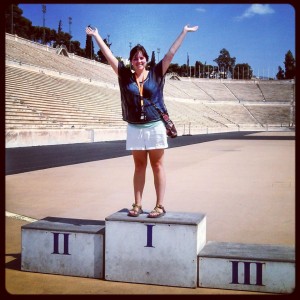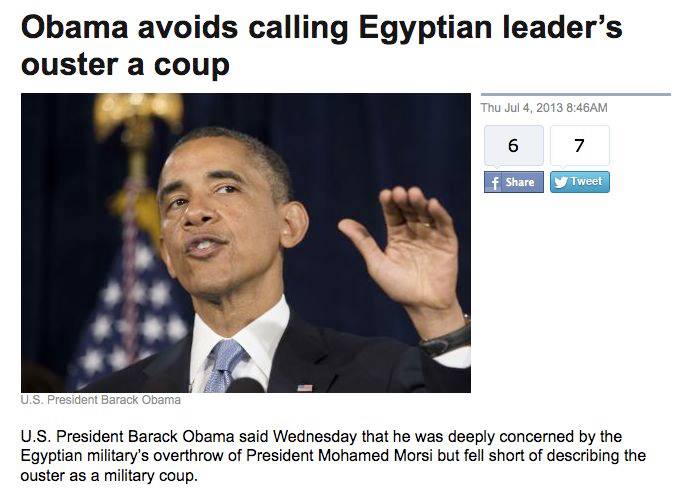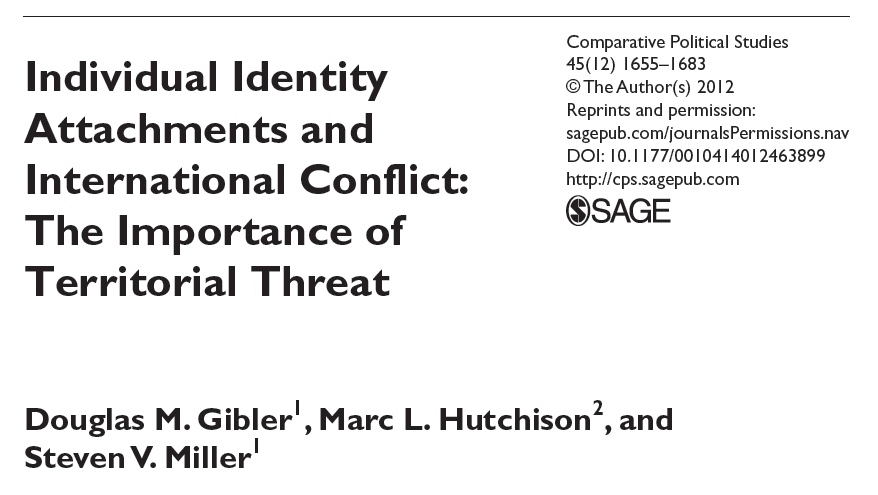 A quick post in honor of our site’s Curator, who is currently seeing the sites/sights in Greece with Vaia, a member of Culture on the Edge: above is Andie on the victor’s podium at the white marble Panathenaic Stadium — (re)built for the first modern Olympic games, in 1896, on the remains of an 4th century BCE stadium that hosted what we consider to be the ancient games. Continue reading “I’ve Got Your Number”
A quick post in honor of our site’s Curator, who is currently seeing the sites/sights in Greece with Vaia, a member of Culture on the Edge: above is Andie on the victor’s podium at the white marble Panathenaic Stadium — (re)built for the first modern Olympic games, in 1896, on the remains of an 4th century BCE stadium that hosted what we consider to be the ancient games. Continue reading “I’ve Got Your Number”
The C-Word
 There’s been a fair bit of news stories not just about what went on in Egypt the other day but, more specifically, about the U.S. reaction to what went on in Egypt the other day. With around $1.5 billion in annual U.S. foreign aide on the line (second only to its aide to Israel), the reaction is curiously (or predictably? — now that’s a good question!) focused, at least for the time being, on what to classify — and thereby how to understand and react to — what just happened. Sure, an Egyptian general stepped in front of a camera, the duly elected (though now widely unpopular) President was deposed and detained, a number of his party’s senior leadership were also detained, the Constitution was suspended, and military officers swore in its own pick as interim President.
There’s been a fair bit of news stories not just about what went on in Egypt the other day but, more specifically, about the U.S. reaction to what went on in Egypt the other day. With around $1.5 billion in annual U.S. foreign aide on the line (second only to its aide to Israel), the reaction is curiously (or predictably? — now that’s a good question!) focused, at least for the time being, on what to classify — and thereby how to understand and react to — what just happened. Sure, an Egyptian general stepped in front of a camera, the duly elected (though now widely unpopular) President was deposed and detained, a number of his party’s senior leadership were also detained, the Constitution was suspended, and military officers swore in its own pick as interim President.
It looks an awful lot like a coup and it sure smells like a coup, yes — but is it a coup? Continue reading “The C-Word”
All-American Fireworks, Hamburgers, Frankfurters and Yoga

With all-American Fourth of July festivities like fireworks, frankfurters, and hamburgers, we continually construct our identification with an imagined community, as Benedict Anderson emphasized thirty years ago. Like the nation, the values that we associate with the United States, (e.g., democracy, equality, and liberty) are imagined constructs whose conceptions shift over time.
The United States is a nation of immigrants with the Statue of Liberty welcoming the “huddled masses” one of those frequently invoked traits. Beyond questions over the place of Native Americans in the nation of immigrants and contemporary debates over “immigration reform” and “border security,” the recent court case involving a yoga program in the Encinitas, California, public schools (which I have discussed previously here and here) illustrates the imagined nature of this national trait in a surprising way. Continue reading “All-American Fireworks, Hamburgers, Frankfurters and Yoga”
Agreement and the Right to Speak
 People who identify themselves as a member of a community sometimes limit who can represent “their” community, especially if they perceive the community as marginalized or misrepresented in some fashion. Generally, the argument is that only those identified as being within the community have the right to make public representations of it. As an example, a few who identify as Hindus have complained about those not born as Hindus making public and academic assertions about things designated “Hinduism.” Continue reading “Agreement and the Right to Speak”
People who identify themselves as a member of a community sometimes limit who can represent “their” community, especially if they perceive the community as marginalized or misrepresented in some fashion. Generally, the argument is that only those identified as being within the community have the right to make public representations of it. As an example, a few who identify as Hindus have complained about those not born as Hindus making public and academic assertions about things designated “Hinduism.” Continue reading “Agreement and the Right to Speak”
Our Primary Expertise
 When I was a doctoral student, sometime in the late 1980s, I recall Will Oxtoby (d. 2003) — then a professor at the University of Toronto, member of my doctoral supervisory committee and, a few years later, editor of a very popular two volume world religions textbook — saying that theory was like a snowblower (using a suitably northern analogy to make his point); “it helps you to move things around,” he said. Continue reading “Our Primary Expertise”
When I was a doctoral student, sometime in the late 1980s, I recall Will Oxtoby (d. 2003) — then a professor at the University of Toronto, member of my doctoral supervisory committee and, a few years later, editor of a very popular two volume world religions textbook — saying that theory was like a snowblower (using a suitably northern analogy to make his point); “it helps you to move things around,” he said. Continue reading “Our Primary Expertise”
“We Are Canadian, eh?”
 Have you seen this Canadian beer commercial, known as “The Rant”? Airing in 2000, it ran with what was then Molson’s slogan, and was pretty popular in Canada, airing during Saturday night hockey games. In fact, a good friend me a “I am Canadian” key chain back then and I still use–the double entendre of the pithy slogan evident to anyone who knows their brands of Canadian beer. Continue reading ““We Are Canadian, eh?””
Have you seen this Canadian beer commercial, known as “The Rant”? Airing in 2000, it ran with what was then Molson’s slogan, and was pretty popular in Canada, airing during Saturday night hockey games. In fact, a good friend me a “I am Canadian” key chain back then and I still use–the double entendre of the pithy slogan evident to anyone who knows their brands of Canadian beer. Continue reading ““We Are Canadian, eh?””
Religious “Expression”?
 Some scholars of religion talk as if cultural stuff—icons, myths, rituals, practices, ideologies, discourses, etc.—allows practitioners to “express” themselves, their religious beliefs, or simply their “religion.” Other scholars talk as if the use of this cultural stuff has the effect of “constituting” (perhaps by “performing”) themselves, their religious beliefs, or their identity. Continue reading “Religious “Expression”?”
Some scholars of religion talk as if cultural stuff—icons, myths, rituals, practices, ideologies, discourses, etc.—allows practitioners to “express” themselves, their religious beliefs, or simply their “religion.” Other scholars talk as if the use of this cultural stuff has the effect of “constituting” (perhaps by “performing”) themselves, their religious beliefs, or their identity. Continue reading “Religious “Expression”?”
Shifting Identification Strategies

The identifications people make are strategic and context specific, as this article by Gibler, Hutchison, and Miller suggests:
[I]nternational conflict exerts a strong influence on the likelihood and content of individual self-identification, but this effect varies with the type of conflict. Confirming nationalist theories of territorial salience, territorial conflict leads the majority of individuals in targeted countries to identify themselves as citizens of their country. However, individuals in countries that are initiating territorial disputes are more likely to self-identify as members of a particular ethnicity, which provides support for theories connecting domestic salience to ethnic politics.
Being attacked leads you to identify with the nation. But if your nation is the one doing the attacking, all of the sudden you’d rather make alternate identifications …
Forging a Fake
 In honor of one of Culture on the Edge‘s members being in Greece, to do some fieldwork and visit archives, I thought it would be fitting to offer this weekend, public service announcement concerning how to make a fake McDonald’s frappé — which, of course, rivals ouzo as the national drink of Greece. (A frappé, I mean, not a McDonald‘s frappé.) Continue reading “Forging a Fake”
In honor of one of Culture on the Edge‘s members being in Greece, to do some fieldwork and visit archives, I thought it would be fitting to offer this weekend, public service announcement concerning how to make a fake McDonald’s frappé — which, of course, rivals ouzo as the national drink of Greece. (A frappé, I mean, not a McDonald‘s frappé.) Continue reading “Forging a Fake”
Seeing the Ordinary as Curious
Sometime ago, I uploaded to a Facebook album my own version of a Sociological Images post — worth reproducing here, I think: so consider this March 20, 2009, photo of a group of Cameroon’s Baka people performing for Pope Benedict XVI as he left for Angola.
 Simple question: who is wearing a costume?
Simple question: who is wearing a costume?
To rephrase, can you see an ideology to men’s neckties? Why would they have been banned in the 1979 Iranian revolution? Or are they so ordinary, so normal, as to pass unnoticed?
(Admit it: you thought I was just comparing the dancers to the Pontiff, didn’t you?)
